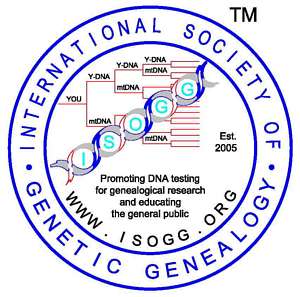Back to Y-DNA Tree Trunk
Back to SNP Index
Back to Papers Cited
Back to Glossary Back to Listing Criteria
Copyright 2006, International Society of Genetic Genealogy. All Rights Reserved.

| LINKS: Main Page Y-DNA Tree Trunk SNP Index Papers Cited Glossary Listing Criteria |
| CLADE/SUBCLADE SYMBOLS: Added Renamed |
| SNP SYMBOLS: Not on 2005 tree Confirmed within subclade Provisional Private |
N LLY22g, M231
�
N* -
�
N1 M128
�
N2 P43
� �
N2* -
� �
N2a P63
�
N3 Tat (M46)
� �
N3* -
� �
N3a M178
� �
�
N3a* -
� �
�
N3a1 P21
Note on the b2/b3 deletion:
A characteristic of Haplogroup N haplotypes is the b2/b3 deletion in the AZFc region of the human
Y-chromosome. However, this deletion appears to have occurred independently on four different
occasions. Thus this deletion should not be considered a unique event polymorphism that
contributes to the definition of this branch of the Y-chromosome tree.
Y-DNA haplogroup N is predominantly found throughout Northern Eurasia. It is the most common lineage in Uralic speakers (Finns and Hungarians). The probable point of origin was Northern China or Mongolia, from which it spread both toward the Baltic and into Siberia. It is a common haplogroup in western Siberia.
References:
Behar et al,
Contrasting Patterns of Y Chromosome Variation in Ashkenazi Jewish and Host
Non-Jewish European Populations. (pdf) Hum Genet 114:354-365, 2004.
Capelli et al,
Population Structure in the Mediterranean Basin: A Y Chromosome Perspective. (pdf)
Annals of Human Genetics, 2005.
Cinnioglu et al,
Excavating Y-chromosome haplotype Strata in Anatolia. (pdf) Human Genetics. 114:127-148, 2004.
Flores et al,
Reduced Genetic Structure of the Iberian Peninsula Revealed by Y-chromosome
Analysis: Implications for Population Demography. (available by subscription)
European Journal of Human Genetics,
12:855-863, 2004.
Hammer et al,
Dual Origins of the Japanese: Common Ground for Hunter-gatherer and Farmer Y Chromosomes.
(abstract) Journal of Human Genetics, 51:47-58, 2006.
Karlsson et al,
Y-chromosome Diversity in Sweden - A Long-time Perspective.
European Journal of Human Genetics, 1-8, 2006. (Comments on paper from Dienekes' Anthropological
Blog - fee for paper from www.nature.com/ejhg)
Regueiro et al,
Iran: Tricontinental Nexus for Y-Chromosome Driven Migration. (abstract)
Human Heredity, Vol. 61, No 3, 132-143, 2006.
Rootsi S,
Human Y Chromosomal Variations in European Populations (dissertation) Council of the
Institute of Molecular and Cell Biology, University of Tartu, Oct 2004.
Sengupta et al,
Polarity and Temporality of High Resolution Y-chromosome Distributions in India
Identify Both Indigenous and Exogenous Expansions and Reveal Minor Genetic Influence
of Central Asian Pastoralists. (pdf)
American Journal of Human Genetics, 78:202-221, 2006.
Additional Resources:
Robert Andersen, N Y-DNA Haplogroup Project
Corrections/Additions made since 10 April 2006:
Contact Person for Haplogroup N: David Wilson
| Back to Main Page Back to Y-DNA Tree Trunk Back to SNP Index Back to Papers Cited Back to Glossary Back to Listing Criteria Copyright 2006, International Society of Genetic Genealogy. All Rights Reserved. |

|